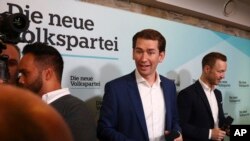Austrian conservatives won the most seats in snap elections Sunday, putting their 33-year-old leader Sebastian Kurz on track to retake power but forcing him into tough coalition negotiations after a corruption scandal sent his far-right former allies tumbling.
Kurz's People's Party (OeVP) won 37 percent, up almost six percentage points from the last election two years ago, but not enough to form a government on its own, according to projections based on partial results.
The Greens were also big winners as climate change rose to the top of voters' concerns, securing around 14 percent of the vote.
That means they will be viable coalition partners for a new government, but Green leader Werner Kogler said on Sunday evening that the party would need to see "radical change" from the right-wing policies pursued by the previous coalition.
Kurz's former allies, the far-right Freedom Party (FPOe), were the biggest losers of the night, falling 10 percentage points to around 16 percent following the spectacular "Ibiza-gate" corruption scandal in May.
The affair brought down the OeVP-FPOe coalition after just 18 months in government and triggered Sunday's snap poll.
The center-left Social Democrats look set for their worst-ever result on around 22 percent of the vote, with the liberal NEOS party winning around seven percent.
A total of 6.4 milion people were eligible to vote in the small Alpine country.
Far-right falls
Kurz told jubilant supporters at party headquarters on Sunday evening that the scale of the victory had left him "almost speechless", but gave few clues as to his next moves.
Before the election, Kurz — a former law student, who has enjoyed a rapid ascent through the ranks to become the youngest-ever chancellor in 2017 — said he would keep all options open.
"It is a big responsibility. We accept this trust humbly and respectfully, and I promise we will do our best to honour this trust," Kurz said.
The FPOe took a bigger hit than expected following the "Ibiza-gate" scandal which brought down its long-time leader Heinz-Christian Strache and a fresh investigation against him announced this week — this time over alleged fraudulent expense claims.
FPOe leader Norbert Hofer, a former aircraft engineer who took over the party afer "Ibiza-gate," told Austrian media that he believed the result meant the party would not take part in coalition talks and was "preparing for opposition".
Previously, a renewed coalition with the far-right — touted by Hungarian Prime Minister Viktor Orban and other nationalists as a model for all of Europe — had looked a likely outcome.
Rebrand for Kurz?
The Greens failed to make it into parliament in the last election in 2017, in a shock result, but have staged an impressive recovery, with an especially strong showing in Austria's big cities.
The Greens' gains put Kurz in a tough spot if he wants to try to woo them and rebrand himself as fighting climate change rather than immigration.
"It's an important vote for the climate. Past governments have done much too little," 26-year-old Peter Litzlbauer, 26, told AFP after casting his vote in Vienna.
However, as the Die Presse daily noted in its editorial on Saturday, "even with a nice plus on Sunday, it is more difficult for him than in 2017" to construct a suitable coalition.
"We had too much chaos in the last months. We hope for something less chaotic," Vienna voter Clara Heisinger told AFP.
Since World War II, either the OeVP or SPOe have always been in government, and for 44 years in total the two have ruled together.
But it was Kurz who ended their last "grand coalition", leading to the 2017 polls.
He has also floated the idea of ruling in a minority government. But this would potentially further bring political uncertainty and even trigger another election.
Either way, initial discussions between the parties are expected to start later this week, and to continue for months.
Ultimately, President Alexander Van der Bellen, a former Green leader, will need to approve any government.
The OeVP-FPOe government imploded in May when two German media outlets published footage filmed secretly on the Spanish resort island of Ibiza, showing then FPOe leader Strache appearing to offer public contracts in exchange for campaign help from a fake Russian backer.
In the aftermath, Strache resigned from all posts, including that of Kurz's vice-chancellor.




